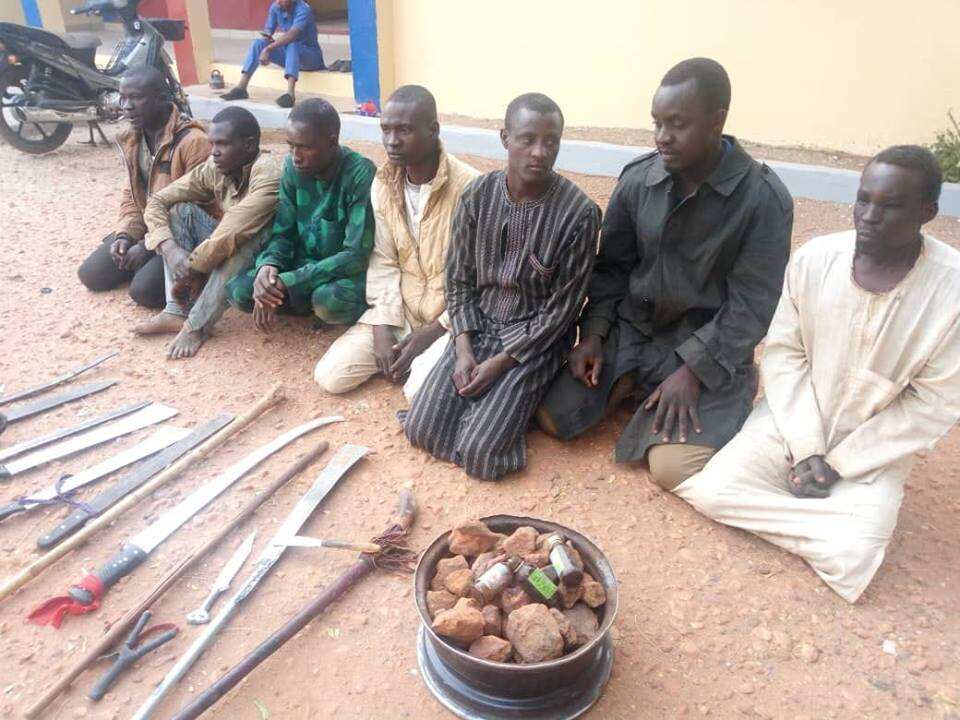- Seven suspected hoodlums have been arrested by the troops of the Nigerian Army in Sokoto state
- The suspects were accused of causing mayhem, extorting and threatening the lives of innocent citizens along Sokoto-Gusau road
- Five machetes, two knives, two catapults, two long sticks, one tyre ream, three bottles of codeine and stones were recovered from the suspects
Troops of 8 Division of the Nigerian Army in Sokoto state have arrested seven suspected hoodlums accused of causing mayhem, extorting and threatening the lives of innocent citizens along Sokoto-Gusau road.
Legit.ng gathers that the disclosure was made by acting deputy director of army public relations, Major Clement Abiade, who said the suspects were being profiled.
READ ALSO: NAIJ.com upgrades to Legit.ng: a letter from our Editor-in-Chief Bayo Olupohunda
The statement read: "Troops of 8 Division, Nigerian Army in Sokoto on the 9 January 2019 at about 6.30pm while on routine patrol for the safety and serenity of the metropolitan ran into a group of hoodlums causing mayhem, extorting and threatening the lives of innocent citizens along Sokoto-Gusau road. Seven (7) of them were apprehended and were being profiled."

The suspected hoodlums. Photo credit: HQ Nigerian Army.
Source: UGC
Abiade gave the names of the suspects as Auwalu Shehu, Muritala Garba, Jamilu Bello, Abubakar Aliyu, Musa Abubakar, Zayyanu Aliyu, Bashir Sarkinpawa.
The spokesman said the items recovered from the suspected hoodlums were five machetes, two knives, two catapults, two long sticks, one tyre ream, three bottles of codeine and stones.
The statement added: "Preliminary investigation is ongoing and the suspects will be handed over to the appropriate authority for prosecution on completion. Members of the public are hereby enjoined to cooperate with the security agencies by reporting any suspicious persons and activities."
Meanwhile, Legit.ng previously reported troops arrested a wanted Boko Haram member identified as Babagana Abubakar (aka Alagarno) at Bulabulim Ngarnam community on the outskirt of Maiduguri.
The disclosure was made in a statement on Thursday, January 10, by Brigadier General Sani Kukasheka Usman, director general of army public relations.
The suspect was apprehended by combined troops of 195 Battalion, Mobile Policemen and Civilian Joint Task Force (CJTF).
PAY ATTENTION: Install our latest app for Android, read best news on Nigeria’s #1 news app
The statement read: "Gallant troops of 7 Division Garrison carrying out cordon and search operations in conjunction with troops of 195 Battalion, Mobile Policemen and CJTF, in some parts of the fringes of Maiduguri today discovered and arrested a wanted Boko Haram terrorists group member called Babagana Abubakar (aka Alagarno), hiding at Bulabulim Ngarnam community.
"He was found hiding in a room in possession of 2 military Ballistic helmets, a pair of military desert boot, a fragment jacket, a Jersey pull over, military backpack, camouflage design shorts, 2 voters identification cards, National identification card, amulets, camouflage T-shirts and military jungle hat. He has since been moved out of the area for further interrogation."
NAIJ.com (naija.ng) -> Legit.ng We have updated to serve you better
Nigerian Air Force Operations Against Boko Haram | Legit TV
Source: Legit.ng
from Nigeria News today & Breaking Naija news ▷ Read on LEGIT.NG 24/7 http://bit.ly/2RqiDk6
via EDUPEDIA24/7
Comments
Post a Comment